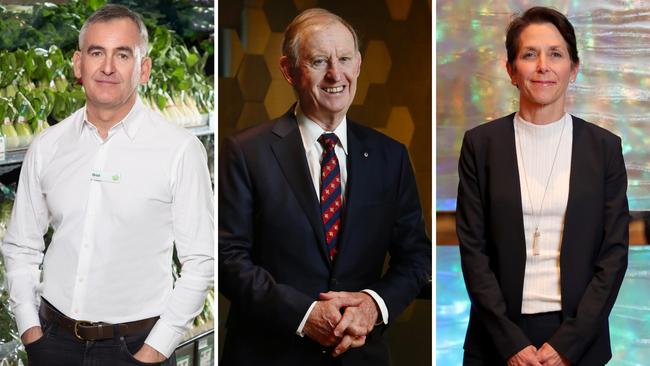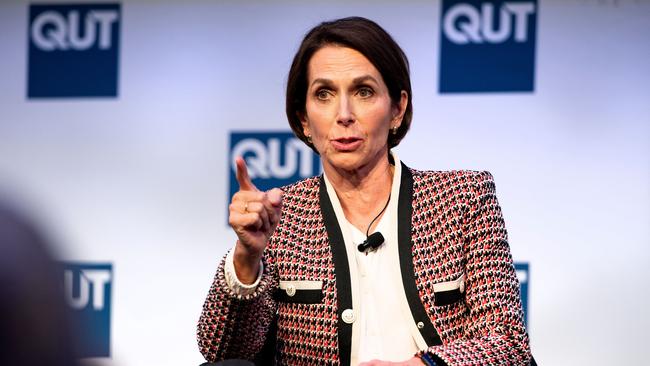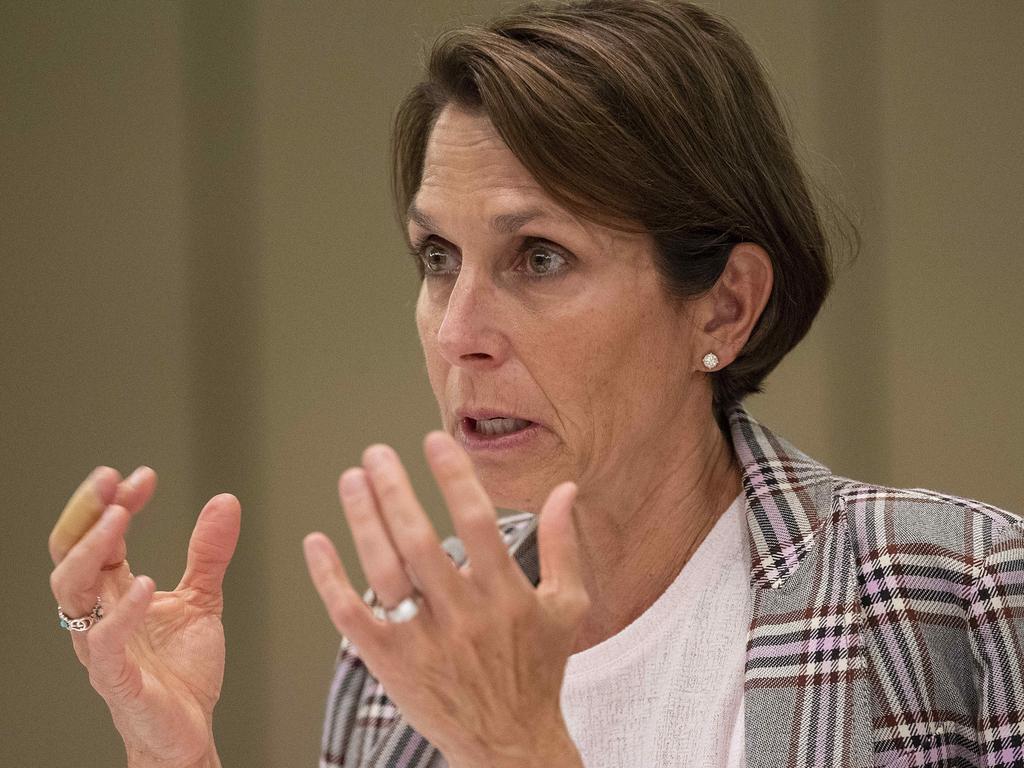Extra regulation, woke boards put CEOs under pressure: David Murray
Former CBA boss David Murray says regulation and boards adopting ‘ESG woke agendas’ are making the job of the modern CEO impossible.

Former Commonwealth Bank boss David Murray said increased pressure on CEOs was a result of boards adopting “ESG woke agendas” with executives left facing a “hangman’s choice” on political and social issues.
Mr Murray was speaking after last week’s announcements of the departures of Woolworths CEO Brad Banducci and Virgin Australia CEO Jayne Hrdlicka. Mr Banducci faced personal attacks over his supermarket’s decision to not sell Australia Day merchandise this year, which he was then forced to explain through a number of uncomfortable interviews and in public advertisements.
Mr Murray said boards were putting their chief executives in situations where they had to take a stand on what should be political or social issues, as well as running their company.
He said this was a very “unhealthy” situation, where the CEO could get drawn into social issues and find themselves being criticised by the media.
“The CEOs are left with hangman’s choice – damned if they do and damned if they don’t.
“The confusion of purpose weakens the CEO’s position as leader.
“Is the company there for a social purpose or a commercial purpose?
“Do employees come to work for these other purposes or is it for the main purpose of the company itself?”
He said the life of a CEO had become much more difficult since he was chief of the Commonwealth Bank for 13 years from 1992 to 2005, when he oversaw the privatisation of the bank.
The veteran business leader said the increased pressure on CEOs was partly a result of boards adopting “ESG woke agendas” which were “working against the clarity of purpose of the company”.
“These agendas are things which should be left to the political process,” he said.
He said it was the role of politicians, not business leaders, to make decisions on policies after weighing up the winners and losers in the society.
“It is a political process,” he said.
He said the problems of the different roles of government and business had become apparent in a previous era with government-owned businesses such as the Commonwealth Bank, Telstra, and Qantas.
“Their founding legislation was unclear about whether they existed for social or commercial reasons,” he said.
“(The leaders of these businesses found it) very difficult, sitting between politicians and government and their organisations, to have clarity about their real purpose.”
He said this confusion was resolved with the privatisation of these former government-owned business enterprises.
But he said when companies these days felt the need to become involved in social issues, the position of the chief executive was weakened.
He said companies also risked alienating some of their staff who could have different views. He said companies’ involvement in issues like the voice and the discussion over the future of Australia Day could “create all sorts of issues and tensions” at different levels of the organisation.
“I don’t believe it’s healthy,” he said.
Mr Murray’s subsequent roles have included being the inaugural chair of the Future Fund and chairman of AMP. “Life for chief executives has become tougher,” he told the Australian.
He said the increasing regulation of companies was putting extra pressure on company boards to become more involved in areas that used to be the sole responsibility of management.
“Increasingly burdensome regulation is adding more complexity on companies,” he said.
“It looks to hold boards more accountable.
“The governance models that boards are adopting have a one-size-fit-all approach which is increasingly complex.
“It is leading to a requirement for more committees and remuneration models, which are constraining the efficiency of the board and the freedom of the chief executive. It is leading to the confusion of the proper roles of the board and the chief executive.”

Separately, consulting firm McGrathNicol is warning entrepreneurs to think twice about taking their companies public, given the increasing public scrutiny of the CEOs of listed companies.
McGrathNicol partner Andrew Fressi said the firm was reminding company owners wanting to list on the stock exchange that the move involved intense scrutiny from a range of stakeholders, including the media and customers.
He said the level of public scrutiny was particularly high for companies with many retail customers, such as airlines and the supermarkets.
He said when the firm talked to entrepreneurs looking at listing their companies, it was asking them to consider the potential scenarios they faced as they moved into the public arena, and whether they could make the same tough decisions to grow their business in the listed environment.
“We are challenging the process,” he told The Australian. “We are just presenting situations to them about how they could be subject to the public scrutiny they are not used to.
“We are talking about very private people.
“They don’t want people to know how much they earn.
“I don’t think they are necessarily thinking about this when they are talking to brokers about listing their company.”
Mr Fressi said Australian entrepreneurs and company founders were now much more easily able to raise funding on the private market without listing.
“There are a lot more alternatives,” he said. “There is private equity which can take a lot of different formats. Private credit is providing a solution.
“There is now access to capital which didn’t previously exist in the Australian market.”
He said some business founders “revelled” in the public spotlight while others found it “challenging”.
The level of public scrutiny business leaders were now subject to had changed significantly in recent years with 24/7 media coverage.
“Twenty years ago, you didn’t have some of the scrutiny that they are under now these days, which creates a lot of personal pressure,” he said. “There is much more scrutiny on people, especially in consumer-facing industries where you have brands and retail customers.
“They are constantly in the limelight.
“They are constantly being challenged. There is more pressure from an investor and customer stakeholder perspective.”
–
‘The CEOs are left with hangman’s choice – damned if they do and damned if they don’t. The confusion of purpose weakens the CEO’s position as leader’
David Murray, former Commonwealth Bank CEO
–
He said the intense public scrutiny was leading some business leaders, particularly CEOs, to leave their jobs earlier than they had done in the past.
The rise of private equity has allowed many companies around the world, including Australia, to delay going public and to delist as a result of private equity takeovers. The number of new IPOs on the Australian market was at one of its lowest levels in history in 2023.
Accounting and advisory firm, HLB Mann Judd, which has been studying the new listings market in Australia for the past 20 years, said in January that 2023 was the worst year for new listings since the firm began its annual study in 2004.
There were only 32 new IPOs on the ASX last year compared with a record 191 IPOs in 2021.
While uncertain economic conditions were a key reason, executives said companies were now thinking more carefully about going public because of the level of scrutiny it involved.
In an interview with The Australian in February, Alisa Wood, a New York-based partner in private equity giant KKR, said the shift was limiting the investment options for retail investors who traditionally invested in listed companies.
She said the opportunity to invest in listed companies was limited as many companies had delisted after being taken private and new companies were waiting much longer before they listed because they have easier access to private capital during their critical growth period.
“There are 40 per cent fewer public companies today than (20 years ago) when I started at KKR,” she said.
“Twenty to 30 years ago, it took companies somewhere in the neighbourhood of six years to go public.
“Today, on average, companies take about 12 years to access the public markets.”
She said many companies now preferred to remain private if they had to do major restructuring, with their managers not having to make quarterly earnings reports to external investors.
Access to private capital is allowing companies like Canva to grow to significant levels without needing to go to an IPO.








To join the conversation, please log in. Don't have an account? Register
Join the conversation, you are commenting as Logout